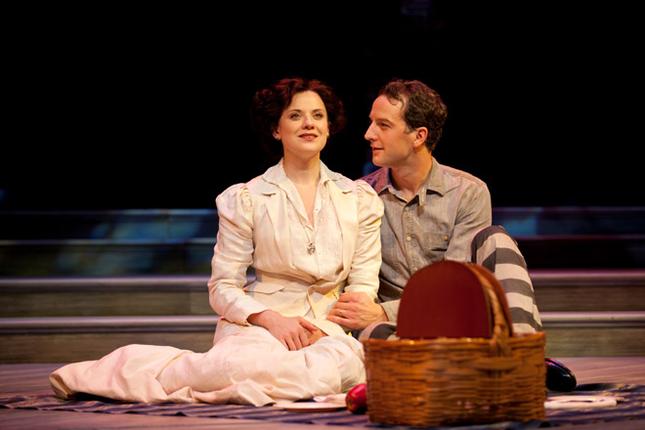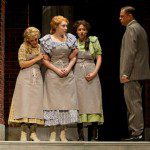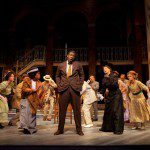‘Parade’ Shows Our Past and Present Dark Sides
By • May 3, 2012 0 2738

“Parade” (now at Ford’s Theatre through Oct. 30) sounds like a musical, it pretends to be a musical, it has fast numbers, soft numbers, ballads and rousing numbers that make you want to tap your feet.
As musicals go, “Parade,” with a book by Alfred Uhry and music and lyrics by Jason Robert Brown, is kind of subversive, so much so that an audience can get tricked into clapping after a rousing song sung by a gifted singer and then almost instantly feel weird for do so.
The number in question is “That’s What He Said,” sung by Kevin McAllister as Jim Conley, an African-American janitor at a pencil factory in Atlanta in 1913. What Conley is singing is his testimony at a trial in which Leo Frank, the northern Jewish factory manager, is being tried on charges that he murdered 13-year-old Mary Phagan, a factory worker and dumped her body in the basement. Conley is singing a song, a bald-faced lie of a story in which he says he was witnessed to the aftermath of the murder and helped Frank dispose of the body. He sings “That’s What He Said” in friendly, furious fashion, it’s almost a vaudeville tune that gets people going, makes you want to dance, in fact.
Of course, that’s not what you should want to do. You should be appalled, shocked, torn and bewildered by your own feelings, the natural inclination to clap for a show-stopping number at war with the horrible lie being told that will help railroad Frank to the end of a rope.
More important, this is a true thing, a horrible event in post-Civil War southern history that was already replete with regular lynching and murders of blacks during Jim Crow days. Frank, a northerner from Brooklyn, had married a southern Jewish woman named Lucille and moved down South to manage the factory. Mary Phagan was killed on Confederate Memorial Day in Atlanta, which included parades and picnics, a holiday memorial celebrating Confederate valor and the loss of the old South.
“Parade,” which had a run on Broadway under the auspices of producer Harold Prince no less, won a couple of Tonys but not much acclaim. It should get some here, where the story and theme resonate mightily. It’s also been deemed the centerpiece of the programming for the Lincoln Legacy Project and is a co-production with Theater J.
It’s also an often powerful, gut-wrenching hybrid theatrical evening. Unsettling and disjointed, a sharp, thoughtful and creatively staged and performed piece that has some of the aspirations of both a serious opera and the kind of conscience-hitting plays that came from Arthur Miller. But it’s also not exactly what it seems to be, which is a musical. You sometimes think that Uhry and Brown are using the genre to get audiences to interact with the material in unaccustomed ways, the better to make an impact.
History tells us—and it’s no secret to tell the results—that in the end, Frank was convicted on almost totally fabricated, suborned lies and testimony by the victim’s friends, by the janitor and the Franks’ maid, among others, to satisfy the still bitter devotion to the Glorious Cause, a lasting hatred of northerners and blacks by the local Ku Klux Klan, supported by the establishment including a rabid newspaper publisher and author whose next book was going to offer up reasons why Jesus was not a Jew.
The approach doesn’t always work. The casual use of non-traditional casting in having African-American actors be members of crowds celebrating the Confederacy seems somehow altogether wrong, for instance. The music is often stirring, or, in quieter pieces with Frank and his wife, lovely and touching. Then again, songs pop up like period pieces from the times, and then again, you get a piece like “A Rumblin and a Rollin’,” which opens the second act, sung by black servants at a party with almost teeth-bared bitterness, a song that nicely is a bookend to a young Civil War-era soldier singing “The Old Red Hills of Home” setting off for war.
In a large cast, some of whom double and triple up, Euan Morton and Jenny Fellner stand out as Leo and Lucille Frank, who, singing and acting, manage to give a full portrait of a married couple. Often at a distance from each other in the early going they reveal their boundless love for each other in crisis. Will Gartshore is downright scary as an extremist politician and newspaper owner, steely and merciless. Stephen Schmidt as governor, John Slaton and Hugh Dorsey as a solicitor general with political ambitions, effectively define men dealing with their consciences: Slaton finds his; Dorsey misplaces it.
In the end, Slaton, after reviewing trial transcripts, commuted Frank’s death sentence to life, costing him his political future. A mob of KKK types broke into jail and hauled Frank out and lynched him. Frank’s murderers were not brought to justice and Mary Phagan’s killer was never found. Frank was granted a posthumous pardon in 1986, showing again, as if we didn’t know, that the wheels of justice grind exceedingly slow.
“Parade” is, I think, a complicated, nuanced work, and the production does it justice and honor. It is not a history lesson, or even a heavy-handed dose of moral lesson. It’s a powerful hybrid that uses the musical theater form as a way of reminding us in disturbing, moving, complicated ways, of how we live today, how far we’ve come, and how issues of tolerance, race, ethnicity, and just plain expressions of out-and-out irrational hatred remain with us.
- Jenny Fellner as Lucille Frank and Euan Morton as Leo Frank in the Ford’s Theatre Society production of “Parade,” directed by Stephen Rayne. | Photo by T. Charles Erickson,




